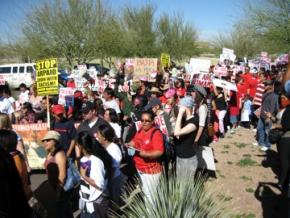Sending a message in Arizona
reports on the building outcry against Maricopa County Sheriff Joe Arapaio in Arizona--and his federal accomplices.
SOME 5,000 demonstrators descended on the city of Phoenix on February 28 in a mass mobilization against the anti-immigrant sheriff of Maricopa County.
The protesters marched four miles in 90-degree heat to make their outrage felt--not only about Sheriff Joe Arpaio, but also the federal government's arrangement with local law enforcement agencies that allow bigots like Arpaio to terrorize and discriminate against immigrant communities nationwide.
The marchers called on Attorney General Eric Holder to launch an investigation into Arpaio's civil rights abuses, a demand that was met on March 10 when it was reported that Arpaio received a letter from the Department of Justice informing him of a federal probe of "alleged patterns...of discriminatory police practices."
The announcement came just ahead of a press conference held by Rep. John Conyers, the head of the House Judiciary Committee, and other figures to show public support for the investigation.
Arpaio, the sheriff of the fourth-largest county in the country, is notorious for his discriminatory and draconian enforcement methods against immigrants, but his latest action--forcing about 250 shackled undocumented inmates to march, before television cameras, to a prison camp enclosed behind an electric fence in the Arizona desert--sparked an outcry among activists and public officials alike.
The protesters chanted "No more Joe!" and "Si, se puede!" and waved signs reading "We Are Human" and "Reform, Not Raids" on the march through downtown Phoenix to the Sandra Day O'Connor Federal Courthouse. The protesters also called for an end to the 287(g) agreement program through the Department of Homeland Security that authorizes local authorities like Arpaio to enforce federal immigration laws.
Arpaio has used the 287(g) agreement as a rubber stamp for systematic racial profiling. Neighborhood sweeps, raids and routine harassment at traffic stops have become standard practice by police under Arpaio's rule.
Among the marchers was Zack de la Rocha, singer for the rock band Rage Against the Machine, who was credited with helping attract a large number of people to the demonstration. De la Rocha spoke out against Arpaio, who he said had "deputized vigilantes" and oversees a "state of terror" against Latino immigrants in Arizona.
"Without the proper warrants, he raids the homes and workplaces of janitors and gardeners," De la Rocha said at a rally before the march. "At routine traffic stops, he detains and deports mothers, violently separating them from their children, who are left abandoned."
Not surprisingly, Arpaio cynically dismissed the indignation of the thousands who protested, saying, "They are not going to deter me."
THE DAY before the march, immigrant rights groups and activists came together at a meeting organized by the National Day Laborer Organizing Network (NDLON) to hear testimonials about Arpaio's abuses and to develop local and national strategies for ending the 287(g) agreements.
Rev. Whit Hutchinson, a faith leader and immigrant rights activist from the Washington D.C. area, was in Phoenix representing the National Sanctuary Movement. "The situation in Arizona shows the extent to which the right is willing to take federal laws like the 287(g) program and use it to abuse people's civil rights," he said.
In addition to protests, religious and grassroots organizations collected thousands of signatures demanding the investigation that is now underway. Groups have also organized local teach-ins to raise awareness about the terror Arpaio has visited on immigrant communities in Arizona.
Activists are concerned about the conditions in Arpaio's "tent city" prison camp as well. As spring and summer approach, the situation for undocumented inmates being held in tents with concrete floors and metal beds in the middle of the desert could become insufferable.
A number of public officials, including some members of Congress, have joined activists in taking a stand against Arpaio. Responding to pressure from immigrant rights groups, four Congress members, including Conyers, sent a letter last week to Holder and Homeland Security Secretary Janet Napolitano to demand an investigation. "Members of the Latino community--whether they are U.S. citizens or foreign-born, whether they are legal immigrants or undocumented--feel under siege," the letter read.
Pablo Alvarado from NDLON said he was happy that the federal investigation had been announced. "We applaud the Department of Justice for initiating its investigation," Alvarado said, "and we look forward to working with the new administration as it tackles the challenge of reforming immigration laws."
When anti-immigrant bigotry finds expression and authority through law enforcement measures and federal immigration law, it is the obligation of activists to fight back.
The case of Arpaio in Arizona is only one among many attacks on documented and undocumented workers that need to be challenged on a national scale, especially as the movement prepares for upcoming May 1 demonstrations. Building on the momentum of opposition to Arpaio will be crucial for activists' efforts to end the 287(g) program and the devastating raids that are tearing immigrant communities apart.
Arpaio may claim that he "will not be deterred." But activists are making it clear to him and to federal immigration officials that neither will we.



